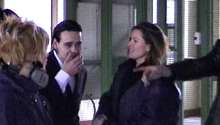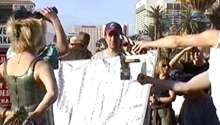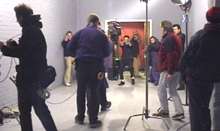
Back to the shoot then David. Now, at last, you have industry backers. You have the cash, you have a budget. How much cash? How low a budget are we talking here and how did you plan to keep your costs down?
Ahhh. I would rather tell you if I wear women’s underwear than tell anybody the budget!! Not that I wear women’s underwear! It was a low budget, but low budget can mean anything in the UK. To put it at its simplest, it will not have to go through the roof to recoup profits. It’s the film that is important, not the budget. Saying that, I would not want to work with this budget again. Some first time directors have had budgets I can’t believe and they don’t make a bean for anybody! I know Pasty Faces will make a good profit for everybody. I have no doubt about that. Ask me in six months and I will gladly tell you the budget.
What were your format options between say, 35 and 16mm, or between film and high-def video tape, or between traditional cut and splice edit and computer edit? What combination did you finally select and why?
We shot on film. We were going to shoot on 35mm, the budget was tight but Panavision were so into the project they would have given us a great deal, but mobility wise, it was sensible to shoot on super 16mm and transfer. I think if you are making a Jerry Bruckheimer $100m budget film, slick 35mm is essential, but for funny character and story driven movies super 16mm is great. "Lock Stock" was shot on that", the audience don’t care if they are having fun.
Now, casting. You were already on the director’s couch, so a plum debut role for David Paul Baker then! What about the rest of your cast?Who did you choose and where and how did you find them?
The budget was low but I could have got some names, but I really wanted to go with unknowns. That saying they have in Hollywood, if you can’t get Tom Cruise then I wanted John Smith, or something like that. Look at Blair Witch, East is East, etc, ask somebody on the street who is in them and most can’t tell you. The film as a whole is the star. What makes it this way of course is the whole team. I wanted the characters, people who could fully realise them. All the cast are terrific.
Talk us through them…
Alan McCafferty plays a young, talentless Method actor. I saw him in a short film in a video workshop just after I made the trailer in Vegas. He just jumped off the screen. A one-in-a-million presence. He had an edge and depth to him but was also a prankster. Cora Bissett, who plays anex-groupie we pick up in the dessert, was cast two weeks before the shoot. I was casting in Glasgow and had searched London. She was rehearsing for a play upstairs and she came down to look for a broom from the janitor and stumbled on the auditions. She had acted mostly in plays, was a singer who had supported bands like Blur and Radiohead, and again, she was perfect, did not have the drama school actory thing about her.Gary Cross, who Plays Steve, had been around for years, like me, just looking for a good break. I had him from the first digital shoot, like Alan. A solid pro who had done his graft and he was perfect for Steve. The other male was not really an actor, Martin McGreechin, but he was spot on for the part. I went through sackfuls of CV's, but most actors look and sound like actors, I wanted the characters. Casting is of major importance. Lastly, We have Chloe Annett from Red Dwarf. She plays a slick kind of henchwoman who is on the heist with this mad lot. She was great. I could not have dreamed a better cast. That goes for all the smaller roles too. We all got on terrific. We are all a bit like the Dirty Half Dozen.

You were a filmmaker from another country — another continent —how easy was it to find the right crew?
I was determined to get a crew that did not think they were doing us a favour because it was a low budget film. So I picked everybody who was hungry. Some had worked on big budget films and some on other medium budget features, but a lot of films don’t go anywhere. This was something fresh they were all excited about, so all the crew were so into it. Right down to the sparks, they went the extra mile. I even saw a spark helping us one day for nothing when he was not supposed to be there. I think that is rare! Ha ha.We took most of the crew to the States with us, so it was mainly assistants on the other side. I can’t remember how many there were, just under fifty in total.
Again, you were working on a different continent, with a different work culture, different rules. How did you cope? Or were you so guerrilla that there were no rules!
We never shot guerrilla on this, that was only in the promo. Me and my sister sneaking fake machine-guns into Caesar’s Palace! That was not possible on a film you have to get right. We had a union problem with our first AD. He had to back out the day before the shoot, which was a bit hairy, but he was replaced that night. On the whole, the Americans were great.
Locations? What did you get?
We had a spot in the Hollywood Hills where Steve and Bobby’s bus is. We got Culver studios where they shot Gone With The Wind, and we even shot inside Los Angeles Airport entrance. It got a bit bizarre some days. We were shooting on the Vegas strip one day and we had a police escort who stopped all the traffic for us. We just laughed inside the people carriers when some people chased us, because they thought we were somebody big. We couldn’t take it serious but the Americans take their filmmakers deadly serious. So they helped us a lot.They gave us a penthouse in the Stardust Hotel, let us shoot in the Stratosphere Tower, and even stopped the huge tower turning for us so a table in the restaurant could be in line with the Vegas strip way, way below. Again, kind of bizarre as we were looking around for free extras for the scene, but we could get the Tower stopped! It sounds like a big budget film, but believe me it was not.

How long did shooting take and how long in your locations?
It was a very fast shoot. About ten days in Glasgow, and three weeks in the States. I went against all the rules of making a first low budget film. They say set it in the one room and chop everybody up physically or psychologically. I agree with that, but I wanted a low budget film that looked like a movie, that had great locations. But you pay for it in another way, as we were doing a lot of set ups each day. I lost count of the amount of locations, there was a lot. The film constantly moves.
Post next. How did you tackle Pasty Faces in post-production?
I had a strong vision for the music, but the music costs would be huge, so I did have to compromise there a lot. Especially when you want Dino and Sinatra all around. So we took a different route with the music, which is not a bad thing as a lot of Vegas movies are saturated with Sinatra and Elvis. It has a techno kind of Ska feel too it, the Clash etc. We have people in the music industry who saw the first screening and offered tracks from top bands. The Producers are dealing with that at the moment.
The music used in the trailer sounds pretty powerful, punchy. How did you go about creating your score?
A couple of guys from Kick Productions did the score. As far as I know this was their first feature, but you wouldn’t have known. Because we took a different route from what I envisioned from the start, I was open to a lot of suggestions from them, but there was a very fine balance. I didn’t want a techno club culture feel like Trainspotting as the whole tone of the film is not like that. The humour still had to come through. In the end I think they got a good balance. They had to get that sillyness into it too, a kind of gritty version of the Monkees. Although it’s not as pranksterish as that. Is that a word?
It is now and it’s published on Netribution David! Let’s move on to marketing. Dov S-S Simens of the famous 48-hour film course always says 60% of the filmmaker’s effort should go into marketing. Do you agree?
Absolutely! What’s the point of making a film if it is just for you and your mates. A film is not a film without a room packed full of people. And since there is a lot of money put into a film, it is a lot of responsibility to take on, you have to think of the marketing. There is this attitude that some people have, especially in personal films, "Oh I don’t care if only one person sees it!" What’s the point of that? We are in an industry that is there to entertain, or inform, inspire, it’s a bit selfish to solely make it for yourself, especially if you get a lot of money from others. If it is your own money, no problem with that. I admire Gary Oldman for that with Nil By Mouth.
 ã
ã What’s your approach to the market going to be? How and where will you pitch Pasty Faces?
The distribution company let me set up a site for the film. www.pastyfaces.co.uk So, we have started to market within the net before the publicity outside the net starts. Trying to create word of mouth, and it is working. It is less than a week since we set up and we are getting thousands of hits by the day. My main goal is to get the address of the site to the public. So any radio, press, and TV slots I get, I get the site address across. To push it on TV, I thought of tattooing it on my forehead, but I plan to make a lot of movies in the future so I might run out of space! Maybe not though, as everybody presumes your head gets bigger if you become successful! No seriously, I think getting the net site out there is important whether it is a popcorn film like Pasty Faces and if it is an art film, even more important. You can’t afford to do that Bobby De Niro, Kubrick thing from the 70’s and remain mysterious and aloof, there is too much competition now. You have to get the film out there.
You have said clearly that the project could never have succeeded without the backing given to you by your mum and your sister. As we know, filmmaking is a business as much as an art or craft. What in particular were they contributing to your company, Lone Wolf Productions?
TRUST!! This is a business full of sharks. If you can’t trust your mother and Sister then you can’t trust anybody. The people I just worked with were great, but we had that attitude from that start and for the future. The other angle is very important - my Mother was great on the ‘phone. Getting great deals, usually you get filmmakers ‘phoning up and begging, pleading for them. It intrigued more people with my mother at the other end of the phone. I would come in late some nights and she would be speaking to a head of one of the studios. A lot of filmmakers could not even get past the secretaries.A lot of this business is common sense, not burning your bridges with people. Having my Mother and Sister there shows we are a strong sensible company, as the creative talent alone can sometimes go a wee bit off the rails! We are a good balance with each other. Controlled anarchy. Anyway, Scorsese had his Maww in almost every film he did. It’s not as rare as it seems. Also, my mother and sister helped me a lot financially. They are the only one’s who believed in me from the start.
She’s your rock then. Your mum’s been seeing to your Making Of documentary featurette as well. How do you rate her as a documentary maker?
Again, a lot of people helped us, with deals all the way from the start. Without those deals we would not have a documentary. She has met music licensing people when we were at a screening in London, composers, and even music industry people. Building up these relationships for the documentary and for future projects is invaluable. She is a people person, I am not great in social circles like that.
Do have fall outs with your mum? How do you get on professionally?
We are extremely self critical of ourselves, we rip ourselves apart. We are not mother and son when it is business. It’s not like that. So it’s not some filmmaker who just made a film with his mother by any means. Everybody says they have the best mother in the world. In my case, I could not have got this movie off the ground without her -but she knows I play a little part in that too!- as it has been very tough. It should be.
There’s a lot of perspiration in making movies. More maybe when you are fresh on the scene. Would you be prepared to put your mum and your sister through all that effort again?
They put me through it all!! Ha Ha. They love it. A few years back they couldn’t understand me not wanting to do nine to five. Since this project they have the bug big-time. As for perspiration, my Mother mainly works on the phone and she does a lot on the net. As for my sister, she is still in her nine-to-five but it looks as if we will have the go ahead to also produce our next feature, so will be doing it as a team. Julie will hopefully be able to leave her job for good to concentrate on this full time.
So what are you lining up for mum and sis to take on next?
It looks like we are going to produce our next feature Artful Dodgers. Set in Glasgow. We will probably have another producer on this too, but we will do the main bulk. Which also helps get more creative control of the project. We also have a big budget American feature we hope to go into development with soon, for a shoot at the end or beginning of next year strike permitting! We won’t be producing that, too big. We are also in the middle of finishing the documentary.
You seem to have a preference for American themes - American settings certainly — do you think a Scottish filmmaker like yourself can do justice to stories set there…really make impact with the place, the culture?

I think someone that is not from there but understands that culture can sometimes bring a better perspective. Sam Mendes didn’t do bad with American Beauty. I just wrote American Dreams. It is set in L.A and Las Vegas again. Very different from Pasty Faces. The main theme was influenced by the trips in Vegas, and I noticed something about Vegas that led to an original story that has not been done before.As for being more into American themes. My father took me to an independent cinema to see a re-run of The Godfather when I was ten. Movies never came out of Scotland, and they still don’t, in the movie sense. On a whole though, universal themes are universal themes. Although don’t look for heavy themes in Pasty Faces. It’s a fun Saturday night entertainer.
What are your expectations for the film on the US home market? Will they be amused by the antics of these Glasgow lads on the loose in the Land of the Free or will they find it a bit strange and maybe a wee bitty unintelligible Jimmy?
Americans seem to like stories with characters that are down on their luck and out of their territory, Crocodile Dundee, Midnight Cowboy, Rush Hour, plenty of others. The humour comes a lot from this. Us being mistaken for commie Russians and Polish for instance. As for the accents, we were very conscious of this. Our Producer (Christopher Figg) was the Co-Producer of Trainspotting, they had to redo a lot of the accents for the States in that. I decided it was best to have one character where we could focus on that. So he has a Speak and Spell machine when ordering food in the diner. On a whole though the accents are understandable but not sanitised. Our American crew kept us in check. If they had a puzzled look after certain lines, then we readjusted!
What about our own culture? Are you not drawn to making films in Scotland? After all, a great story is a great story, wherever it is set. Why not A Clydebank Love Story instead of A New York Love Story? …Or are you, yourself perhaps, a closet Yank!
As I said. I was brought up with American movies, American culture. There were no movies coming out of here. I have a love of indie films, love Ken Loach social realism, but I still have that love of the movies’ magic where you sit with popcorn and watch a colorful American movie. I don’t think we really pull off that MOVIE feel in this country. Our next film is in Glasgow and the theme of it reflects the city.
Well David, congratulations on becoming a transatlantic film guerrilla, or maybe you’d prefer being known as a Mid-Atlantic Popcorn Movie-Maker.One final question. After all that effort, all that great determination that’s needed to make a feature come to fruition, is there any one thing you can look back on and say "Yes, I should have done that differently!"
Almost everything. I think if you don’t think this way then that is the death of you and your work. If you think what you just did is brilliant, you are dead. It’s all about making mistakes. And not being afraid to make mistakes. I think Pasty Faces will do what it set out to do though, give people a good laugh. Simple as that!